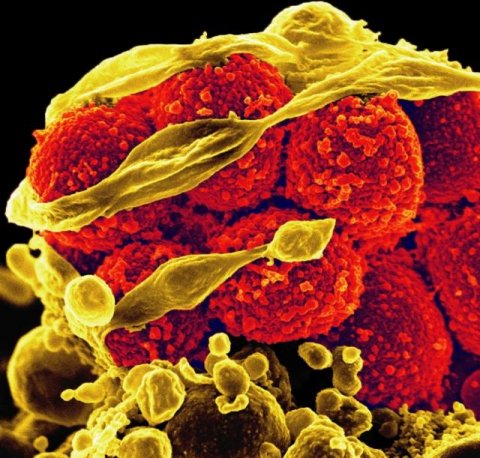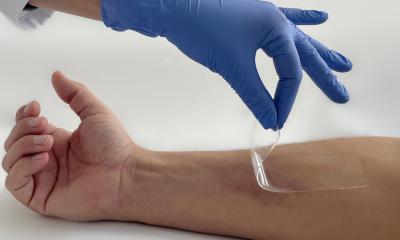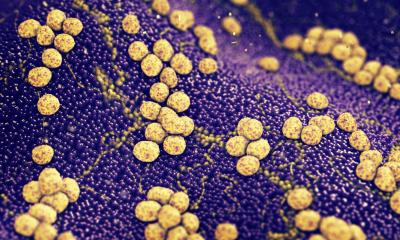News • Teixobactin against superbugs
Researchers find 'resistance resistant' antibiotic
University of Melbourne researchers are finding ways to beat dangerous superbugs with ‘resistance resistant’ antibiotics, and it could help in the fight against coronavirus (COVID-19) complications.
As bacteria evolve, they develop strategies that undermine antibiotics and morph into ‘superbugs’ that can resist most available treatments and cause potentially lethal infections. The Melbourne team has shown that a newly discovered natural antibiotic, teixobactin, could be effective in treating bacterial lung conditions such as tuberculosis and those commonly associated with COVID-19. Their work could pave the way for a new generation of treatments for particularly stubborn superbugs.

Image source: NIAID/NIH, Methicillin-resistant Staphylococcus aureus (MRSA) Bacteria2, marked as public domain, details at Wikimedia Commons
Teixobactin was discovered in 2015 by a team led by Professor Kim Lewis at Northeastern University in Boston in 2015. His company is now developing it as a human therapeutic. The new University of Melbourne research, published in mSystems journal, is the first to explain how teixobactin works in relation to the superbug Staphylococcus aureus – also known as MRSA. MRSA is among bacteria responsible for several difficult-to-treat infections in humans, particularly post-viral secondary bacterial infections such as COVID-19 chest infections and influenza.
University of Melbourne Research Fellow in anti-infectives Dr Maytham Hussein and Associate Professor Tony Velkov’s team synthesised an aspect of teixobactin to produce a compound that showed excellent effectiveness against MRSA, which is resistant to the antibiotic methicillin. Dr Hussein said that there was no way to stop bacteria like MSRA from developing resistance to antibiotics as it was part of its evolution. This made combatting it extremely challenging. “The rise of multi drug-resistant bacteria has become inevitable,” Dr Hussein said. “These bacteria cause many deadly infections, particularly in immunocompromised patients such as diabetic patients or those with cancers, or even elderly people with post-flu secondary bacterial infections.”
Recommended article

Article • Fighting infections
‘We are sitting on a ticking time bomb’
Multidrug-resistant organisms (MDRO) are keeping infection specialists worldwide on their toes. One of these specialists travelled all the way from Leipzig to India to gain insights in one of the sources of the problem.
These novel results will open doors to develop novel antibacterial drugs for the treatment of multi-drug resistant Gram-positive infections
Tony Velkov
The University of Melbourne team is the first to find that teixobactin significantly suppressed mechanisms involved in resistance to vancomycin-based antibiotics that are recommended for complicated skin infections, bloodstream infections, endocarditis, bone and joint infections, and MRSA-caused meningitis. The development could lead to new lung infection treatments and Associate Professor Velkov said it would greatly facilitate the pre-clinical development of teixobactin. “Bacteria often develop resistance towards antibiotics within 48 hours after exposure,” Associate Professor Velkov said. “The bacteria failed to develop resistance towards this compound over 48 hours. These novel results will open doors to develop novel antibacterial drugs for the treatment of multi-drug resistant Gram-positive infections – bacteria with a thick cell wall – which are caused by certain types of bacteria.”
Source: University of Melbourne
03.06.2020





